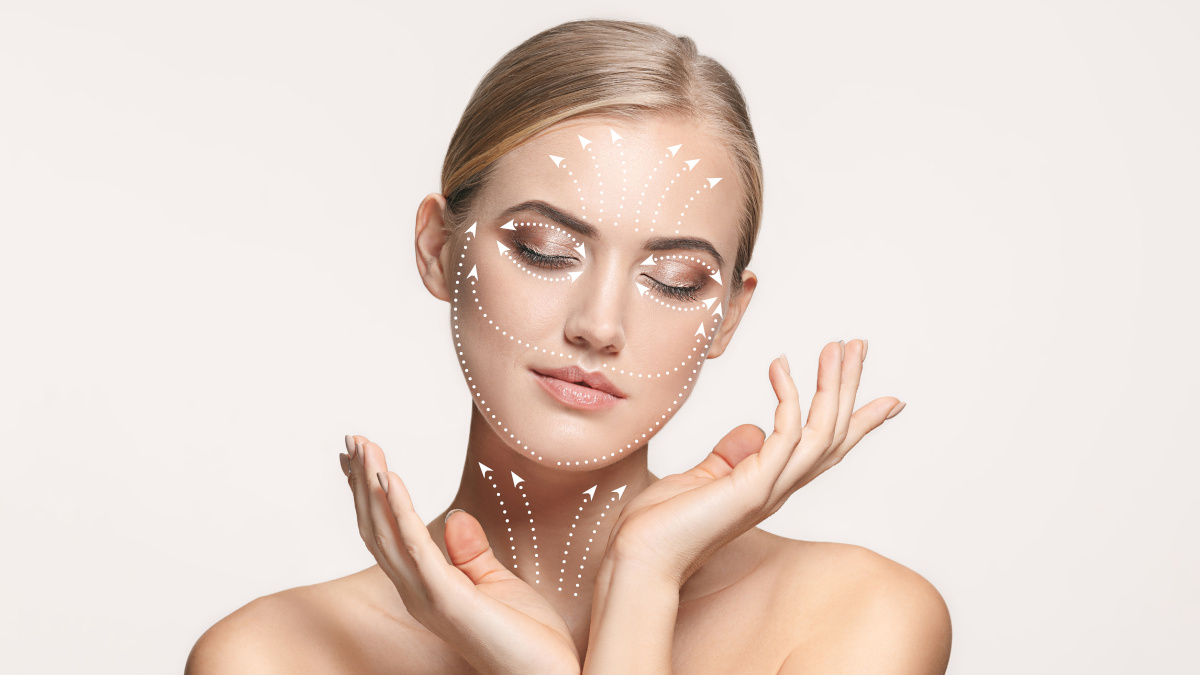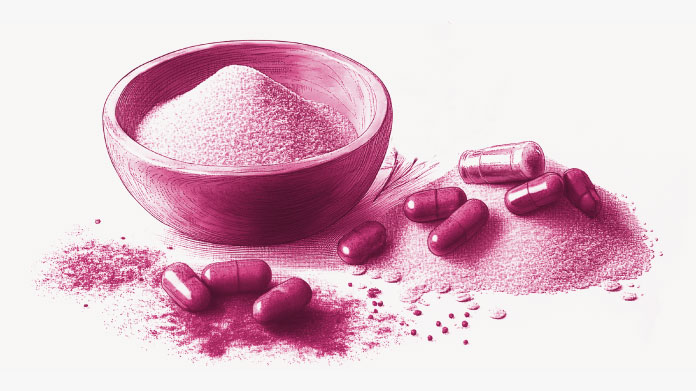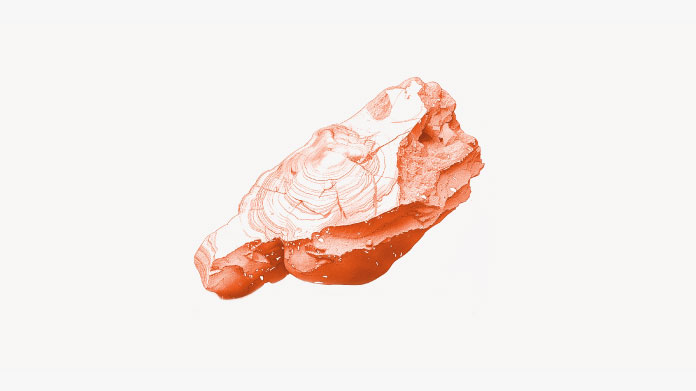What’s the best collagen supplement?
Native, hydrolyzed, marine, type I, type II, type III collagen: it’s difficult to choose with so many alternatives available. Which collagen supplement should you opt for? Read on for the answers.

Collagen: an essential protein for maintaining tissues
Collagen is actually a protein made up of numerous amino acids. It’s the most abundant protein in the human body (1).
In fact, if water is excluded (so dry weight), collagen represents:
- 70% of cartilage weight;
- 85% of tendon weight;
- 70% of ligament weight;
- 75% of skin weight;
- 90% of organic bone matrix weight as well as of the connective tissue attached to muscles.
Collagen is the protein which gives firmness and elasticity to almost all the body’s tissues.
So it’s collagen that ensures the skin stays supple and radiant. It’s also responsible for the resistance of tendons, ligaments and bones and is thus essential for maintaining healthy joints (2).
A protein that diminishes with age
While the body produces collagen naturally from proteins supplied by the diet, this production starts to diminish from the age of 30, mainly due to declining hormone production. And this is exacerbated by the fact that modern diets tend to be low in collagen-building nutrients.
It’s thought that from the age of 40, natural collagen production declines by 1% a year, potentially reaching a rate of 30% a year at the age of 70 (3).
That’s why, as we get older, wrinkles appear, our joints become weaker and sometimes painful, we suffer more frequently from tendinopathy, our bones become more fragile, etc.
All the more so because smoking, alcohol consumption and excessive sports activity all lower the production and quality of collagen fibres (4).
That’s why cosmetic surgery has been championing this protein since the 1980s: surgeons inject collagen into wrinkles to make them disappear, temporarily restoring tone and radiance to the skin. But the effects are short-lived: within a few weeks, the collagen is eliminated by the body and the wrinkles reappear.
The different types of collagen: hydrolyzed, type 1, type 2, type 3 ... ?
Many people who reject the cosmetic surgery route but who want to minimise the effects of aging choose to take collagen in the form of a dietary supplement. But there’s huge range of products to choose from.
While there are actually 28 types collagen in living organisms, the main forms used in supplements are types I, II and III (5):
- type I collagen is found in skin, tendons and bone tissue;
- type II collagen is found in cartilage;
- type III is found in muscles and blood vessel walls.
However, for these large collagen proteins to be absorbed by the body, they have to undergo a process of reduction, usually by hydrolysis, in order to break them down into amino acid chains: collagen peptides (6).
Indeed in its native state, collagen is too large a protein for uptake by the body. This ‘reduction’, whereby collagen is converted into peptides, helps to make it absorbable.
As a result, whether the collagen is originally type I, II or III, following hydrolysis, it no longer corresponds to a particular type: the collagen peptides are used by the body as required, and cannot be specifically targeted (to the skin, joints, cartilage, tendons, muscles, etc.). (7)
The best collagen supplements on the market
There is one type of collagen, however, that’s an exception to this rule. While native collagen cannot be absorbed by the body for boosting the skin, joints, tendons, bones or muscles, there is a form of native collagen which acts in a different way: collagen UCII.
A unique, patented ingredient, this is a type II native collagen which potentially has an immunomodulatory effect in the gut, and an impact on joint inflammation (8-10). It’s found, for example, in the supplement UC II®.
Aside from for addressing these specific needs, we’d suggest opting for hydrolyzed marine collagen (ie, in the form of collagen peptides), which is absorbed better by the body than bovine or porcine collagen because of its lower molecular weight. This means it can cross the intestinal barrier more easily to reach the bloodstream (try, for example, the excellent Marine Collagen, a patented, hydrolyzed marine collagen with high bioavailability).
Collagen-rich supplements for the skin
To take care of your skin, you can also opt for synergistic formulations which combine the effects of several ingredients.
In particular, there are supplements that combine hydrolyzed collagen, hyaluronic acid, the antioxidant resveratrol and biotin, a vitamin which helps to maintain healthy skin (try the product Natural Skin Formula) (11).
For a more complete approach that tackles not only the skin but the hair and nails, other synergistic formulations combine collagen peptides with keratin, the protein that hair and nails are composed of, as well as biotin, vitamin B3 and zinc, all three of which help to maintain healthy skin (such as you’ll find in the supplement Daily Beauty) (12-13).
References
- EYRE, David R. Collagen: molecular diversity in the body's protein scaffold. Science, 1980, vol. 207, no 4437, p. 1315-1322.
- BORUMAND, Maryam, SIBILLA, Sara, et al.Effects of a nutritional supplement containing collagen peptides on skin elasticity, hydration and wrinkles. Journal of Medical Nutrition and Nutraceuticals, 2015, vol. 4, no 1, p. 47.
- SHUSTER, S. A. M., BLACK, MARTIN M., et MCVITIE, E. V. A. The influence of age and sex on skin thickness, skin collagen and density. British Journal of Dermatology, 1975, vol. 93, no 6, p. 639-643.
- MORITA, Akimichi. Tobacco smoke causes premature skin aging. Journal of dermatological science, 2007, vol. 48, no 3, p. 169-175.
- MAYNES, Richard (ed.). Structure and function of collagen types. Elsevier, 2012.
- LEÓN-LÓPEZ, Arely, MORALES-PEÑALOZA, Alejandro, MARTÍNEZ-JUÁREZ, Víctor Manuel, et al.Hydrolyzed collagen—Sources and applications. Molecules, 2019, vol. 24, no 22, p. 4031.
- ASSERIN, Jérome, LATI, Elian, SHIOYA, Toshiaki, et al.The effect of oral collagen peptide supplementation on skin moisture and the dermal collagen network: evidence from an ex vivo model and randomized, placebo‐controlled clinical trials. Journal of cosmetic dermatology, 2015, vol. 14, no 4, p. 291-301.
- LUGO, James P., SAIYED, Zainulabedin M., LAU, Francis C., et al.Undenatured type II collagen (UC-II®) for joint support: a randomized, double-blind, placebo-controlled study in healthy volunteers. Journal of the International Society of Sports Nutrition, 2013, vol. 10, no 1, p. 1-12.
- Bagchi D, Misner B, Bagchi M, Kothari SC, Downs BW, Fafard RD, Preuss HG. Effects of orally administered undenatured type II collagen against arthritic inflammatory diseases: a mechanistic exploration. Int J Clin Pharmacol Res. 2002;22(3-4):101-10. PMID: 12837047.
- CROWLEY, David C., LAU, Francis C., SHARMA, Prachi, et al.Safety and efficacy of undenatured type II collagen in the treatment of osteoarthritis of the knee: a clinical trial. International journal of medical sciences, 2009, vol. 6, no 6, p. 312.
- LIPNER, Shari R. Rethinking biotin therapy for hair, nail, and skin disorders. Journal of the American Academy of Dermatology, 2018, vol. 78, no 6, p. 1236-1238.
- CHEN, Andrew C. et DAMIAN, Diona L. Nicotinamide and the skin. Australasian Journal of Dermatology, 2014, vol. 55, no 3, p. 169-175.
- ROSTAN, Elizabeth F., DEBUYS, Holly V., MADEY, Doren L., et al.Evidence supporting zinc as an important antioxidant for skin. International journal of dermatology, 2002, vol. 41, no 9, p. 606-611.
Keywords
4 Days
Easy to navigate site
Easy to navigate site, had what I was searching for, good price. easy order-check out
James Tucker
10 Days
My skin is clearing up nicely!
Pretty good for my skin so far.
Christian
12 Days
The new packaging is excellent
The new packaging is excellent - finally! No more squashed boxes and torn envelopes.
GORAN
13 Days
Great Product
Great Product
Larry Garrett
18 Days
Quick shipping
Quick shipping; good price. No issues!
Mary McCarty
19 Days
Thr product is very good and is helping…
Thr product is very good and is helping me on my health. Then is always on time
LUGO Luz
22 Days
Buying was fine
Buying was fine. I had problems with the website not recognizing my login info, and had to call to get it fixed. Other than that, everything was good.
David S. Clark
22 Days
Your super maca and super ginseng are…phenomenal
Your super maca and super ginseng are phenomenal supplements that compliment each other when taking them together. Fantastic feeling of well-being and lots of mid day energy without the crash.
Keith Mason
25 Days
I have had amazing results with every…
I have had amazing results with every supplement I've purchased. I am extremely satisfied with this company
kirstin Torres
25 Days
Fine products
Fine products . They are on the leading edge of online supplements. The only issue -so far-is they sometime run out of subscription items.
Jason Argos
27 Days
The ordering process is very user…
The ordering process is very user friendly and the products always come in a timely manner.
CARTER Rhonda
28 Days
The price for Dr
The price for Dr. Pero's AC-11 is reasonable and in line with his views. (my former colleague). Keep it pure.
CAMPBELL Clayton
31 Days
Right on every time.
Right on every time.
Arthur Nicholas
34 Days
They are cheaper than everyone else and…
They are cheaper than everyone else and the shipping was fast. Great company.
Patricia Adams
41 Days
Availability of quality health…
Availability of quality health supplements and it's wide variety is impressive. Ordering is seamless and shipping even during the holidays is well streamlined.
Mohamad Hussein




